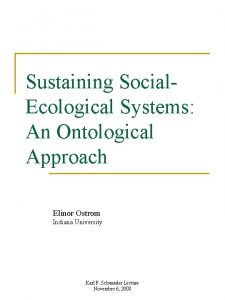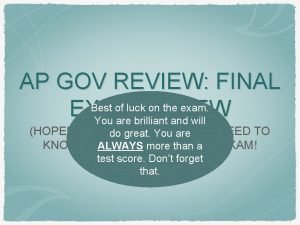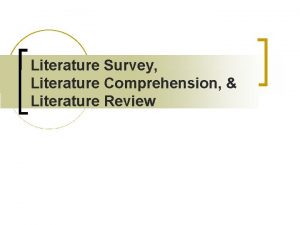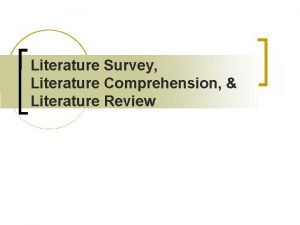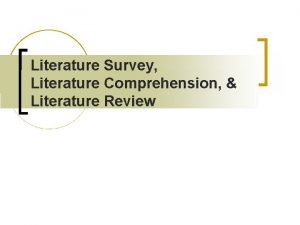Character Education A Literature Review Amanda Ostrom Autumn







- Slides: 7

Character Education A Literature Review Amanda Ostrom Autumn 2014

Purpose Special Education Experience: Specific social skills curriculum is required to meet individual needs specific behavioral needs. Teacher Expectations: Model desired behaviors, teach social problem solving skills as problems arise, create/implement own lesson to instill morals and values. Lack of resources: professional development & curriculums Questions: Does the implementation of school wide character education programs increase academic performance, decrease behavioral referrals, and/or increase student self-esteem?

Literature Review Tannir and Al-Hroub (2013), conducted a study in Kuwait researching the effects of character education on third grade students: (1) overall self-esteem, (2) the difference in self-esteem in regards to intellectual ability, and (3) difference in self-esteem between boys versus girls. Findings: After 5 week implementation of character education program (1) Slight difference in self-esteem progression (2) Students with lower intellectual abilities benefited more from character education (3) Boys had increased self-esteem and girls had decreased self-esteem

More Literature Review… Alice Ledford (2011), conducted a teacher survey study regarding education and professional development around character education. Teachers with some training (undergraduate coursework or professional development) in character education have a greater sense of personal and general teaching efficacy. After implementation of character education in Hawaii over one year: Perception survey results found an increase of school quality, safety and well-being, involvement, and satisfaction by parents, teachers, and students. (Snyder, Vuchinich, Acock, Wasburn, and Flay, 2012) Other Approaches: Hidden Curriculum: embedded in content areas and school wide events (Cubukcu, 2012) Individualized Character Education: Individuals have differences in: responses to dilemmas, environmental influences, occupations, and cultural backgrounds. (Chen, 2012)

Limitations Research based character education programs implemented? Length of time character education programs were implemented Pre/Post Assessments outdated Data interpretation Subjectivity

Next Steps More character education research in regards to: Academic achievement Increased self-esteem Decreased behavior referrals Teacher Efficacy Boys versus girls self-esteem Different Approaches The Virtues Project implemented at Emily Dickinson Elementary: Common Language Decreased behavior referrals Barker,

References Chen, Y. (2013). A Missing Piece of the Contemporary Character Education Puzzle: The Moral Character. Studies In Philosophy And Education, 32(4), 345 -360. Individualisation of Cubukcu, Z. (2012). The Effect of Hidden Curriculum on Character Education Process of Primary School Students. Educational Sciences: Theory And Practice, 12(2), 1526 -1534. Ledford, A. T. (2011). Professional Development for Character Education: An Evaluation of Teachers' Sense of Efficacy for Character Education. Scholar-Practitioner Quarterly, 5(3), 256 -273. Seider, S. , Novick, S. , & Gomez, J. (2013). The Effects of Privileging Moral or Performance Character Development in Urban Adolescents. Journal Of Early Adolescence, 33(6), 786 -820. Snyder, F. J. , Vuchinich, S. , Acock, A. , Washburn, I. J. , & Flay, B. R. (2012). Improving Elementary School Quality through the Use of a Social-Emotional and Character Development Program: A Matched-Pair, Cluster-Randomized, Controlled Trial in Hawai' i. Journal Of School Health, 82(1), 11 -20. Tannir, A. , & Al-Hroub, A. (2013). Effects of Character Education on the Self-Esteem of Intellectually Able and Less Able Elementary Students in Kuwait. International Journal Of Special Education, 28(2), 47 -59.
